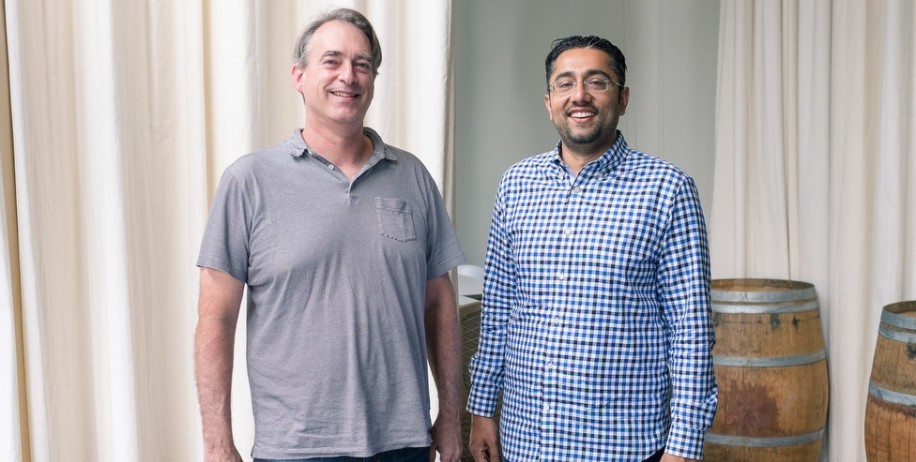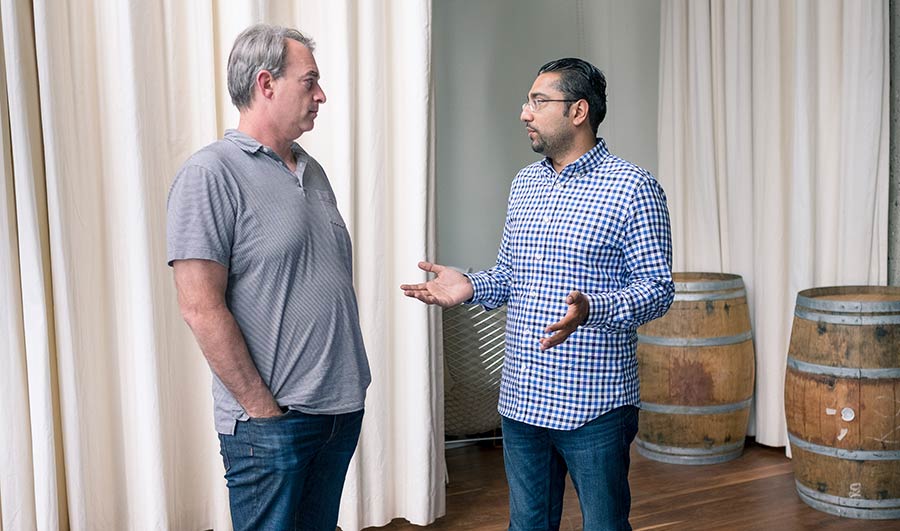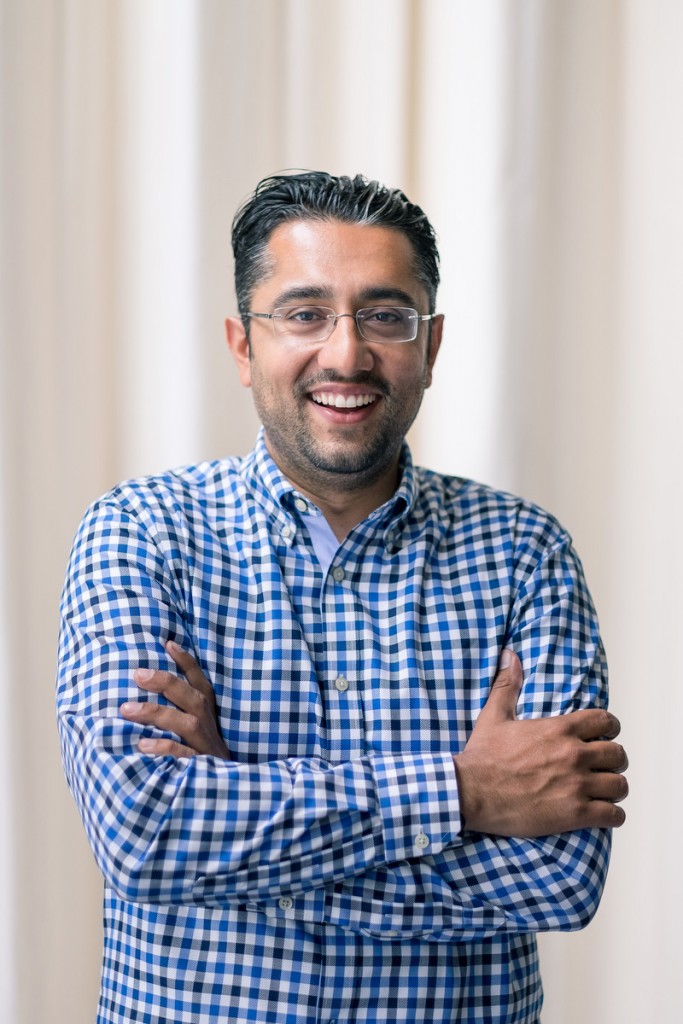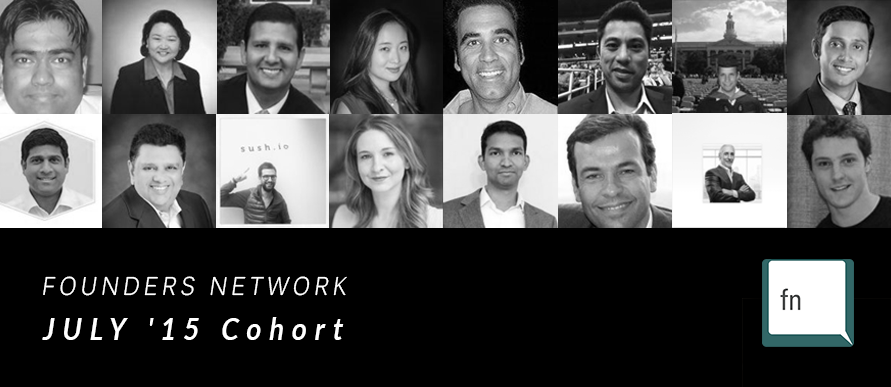
We all know Thomas Edison’s quote about perspiration versus inspiration, but in talking with successful founders, we’ve discovered another important factor for success: commiseration. Regularly connecting with colleagues is the key for many successful founders, whether it’s polling your peers on which tactics to prioritize or simply having people to talk to who understand your specific challenges.
This principle is well illustrated by Will Bunker and Arjun Arora, who met through the Funded Founders peer mentorship group. When Arjun first joined Founders Network, he was CEO of ReTargeter. Since then he moved to the Chairman role, the company was recently sold, and he founded Immediately, a robust sales workflow application for mobile. Will, who founded several successful companies, including the site that became Match.com, joined Founders Network after moving from Dallas to San Francisco. In 2013 he also traded his entrepreneur hat for that of an investor, founding Silicon Valley Growth Syndicate.
 Through the peer mentorship group, and the friendship that grew out of it, Will and Arjun have had the chance to support each other in overlapping ways: Will invested in Immediately, while Arjun has introduced Will to promising companies and has coached his portfolio. We met up with them both at Galvanize in San Francisco, Will’s home base, to talk about the importance of having peers to talk to who won’t think you “sound insane.”
Through the peer mentorship group, and the friendship that grew out of it, Will and Arjun have had the chance to support each other in overlapping ways: Will invested in Immediately, while Arjun has introduced Will to promising companies and has coached his portfolio. We met up with them both at Galvanize in San Francisco, Will’s home base, to talk about the importance of having peers to talk to who won’t think you “sound insane.”
Tell us about the Funded Founders peer mentorship group.
Arjun: It’s for Series A and B funded companies that are growing and scaling and dealing with the associated challenges. Because we all face similar issues, we are able to have very frank conversations. For instance, we might be so busy we’re looking for someone who could help make healthy food for us. Things like that might sound insane to most people, but we understand. Or, my company went from 25 employees to 55 employees and I feel like we’re losing our culture. Those are some of the things we might talk about.
Startups are hard. You need moral support a lot of times.
Will: Startups are hard. You need moral support a lot of times, because most of the other people in your life aren’t gonna understand what you’re going through. And you can’t really blab to your employees, because it would probably scare the shit out of them if you told them what was really happening.
What have you gotten out of Founder’s Network since you joined?
Arjun: When I joined Founders Network, I was the CEO of ReTargeter, and then, in January of 2014 I moved into the chairman role. Since then I’ve spent some time advising, and helped a venture fund get off the ground. I’ve been through a lot of cycles since I joined Founders Network. I like that it is really about the founders, no matter what happens with their company. It’s the network that matters, not the company. I think that’s really important.
FN is really about the founders, no matter what happens with their company.
Will: I just want to stay in touch with what founders are going through. I read somewhere that empathy was one of the skills a good venture capitalist needs. So I take every opportunity I can to practice that.
 Are there other investors in the network?
Are there other investors in the network?
Will: Not many call themselves investors, but there are several second- or third-time founders who will put money in if they know you and they like your idea. But Founders Network probably made an exception for me because I’m kind of a “founder investor,” versus just a spreadsheet guy. Also, starting a fund from scratch is very much like running a startup. I am constantly fundraising, so I’m empathetic to people who have to go around and ask for money.
What was the first time that you guys worked together?
Arjun: Will’s investment in Immediately was the first formal thing we did together. But before that, I shared some experiences from ReTargeter with Will’s portfolio companies—things like marketing and online advertising. And then Will was incredibly helpful getting me through the challenges I was facing right before we sold ReTargeter.
I know you talk more often than just at the group meetings now. How did that develop?
Arjun: We’ve been meeting up for two-plus years now, and during that time you see all the ups and downs and the craziness that builds a strong relationship. Seeing each other frequently, spending time together—we’ve built up a great bond. We have a lot of respect and trust for each other. I feel very grateful we’ve been able to work together in all kinds of ways, while also helping other founders in our group.
Seeing each other frequently, spending time together—we’ve built up a great bond.
Will: Because you have a forum where you’re being a little vulnerable and talking about what might not be going well, it allows you to build trust over time. There’s been several times where I needed help, like I was helping a company with an exit, and Arjun referred a very talented person in that space who worked out really well. And then I’m really happy to have invested a little bit in his new start up. It’s nice because we’re not just talking business, it’s also about, how can we help each other?
 Are there stories of how the group has helped other members, too?
Are there stories of how the group has helped other members, too?
Arjun: One is around Steelcase, which was hosting a special event, and the organizer asked me if I knew any other founders who’d like to go. I recommended a couple of folks, and Richard White (CEO of UserVoice), who is in the group, was one of them. Before we know it, we’re heading to San Jose to jump on a private jet with the CFO from Mozilla, the-ex CEO of Salesforce and several other amazing folks. It was fascinating.
Will also shared some powerful advice about B2B sales automation recently. He shared some more efficient ways to get contact information for the right people to reach out to, to form a relationship and eventually close the deal. We talked about using Data.com, coupled with something like PersistIQ or Outreach.io. That conversation had a tremendous effect on the efficiency of people’s sales processes.
Having people to offer advice in those situations is really important.
Another example, which is less tactical, was a founder who was facing a serious challenge with an early investor. They wanted their money back and the company was running out of cash. It got really messy. But they were eventually able to resolve it out of court, based in large part on conversations we had in the group. Having people to offer advice in those situations is really important.
Do you have any advice about how to get the most out of mentorship?
Arjun: The most important thing is to recognize that everybody has something to share, if you’re open to hearing it. Even if someone’s in a totally different industry, I’ve learned a lot from those folks.
Are you a tech founder in NYC? Come to our event featuring Will Bunker on Monday, December 12th!
============================
Interview by Miki Johnson and photos by Jackson Solway, cofounders of Job Portraits, a creative agency that helps startups hire more effectively by creating engaging, culture-focused content.






